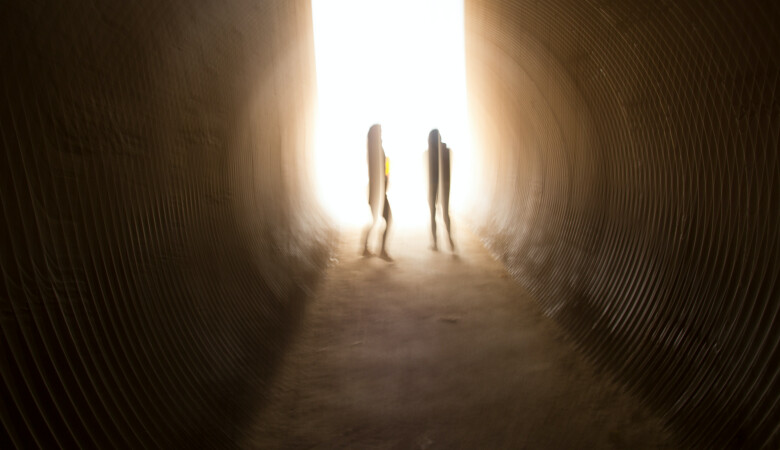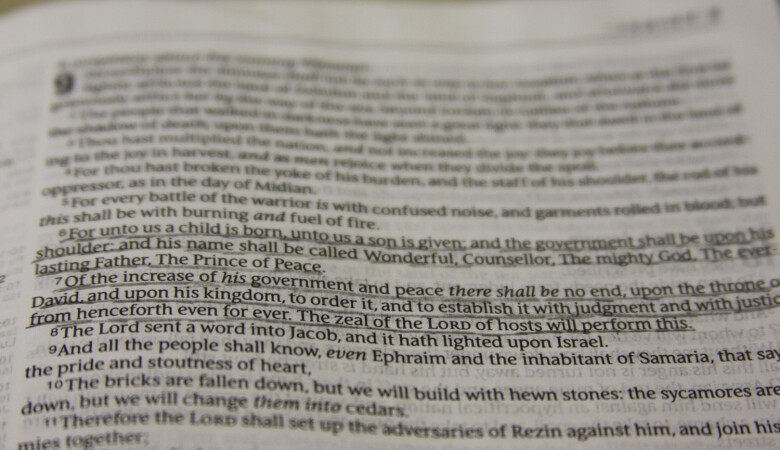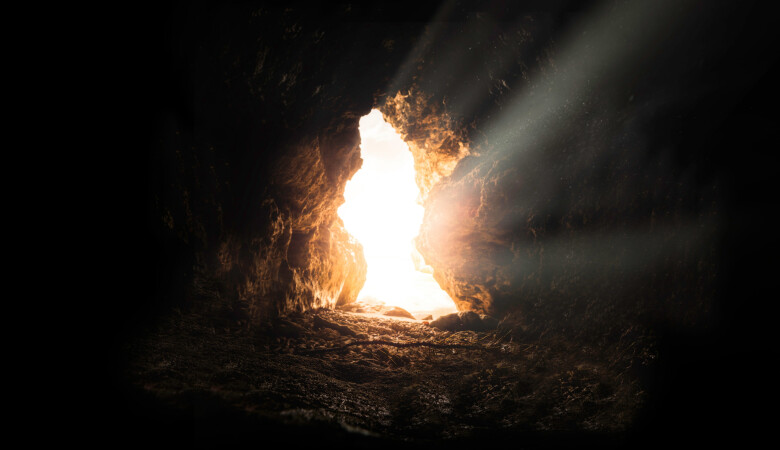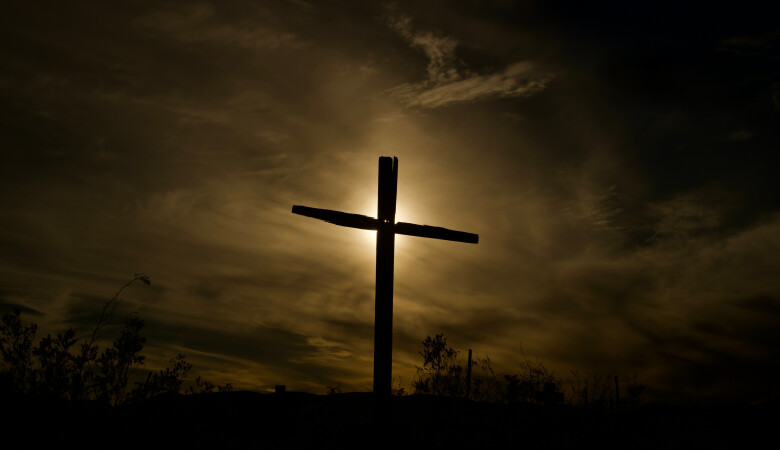The Resurrected Christ's First Appearance to the Apostles
March 23, 2008 | Andy Davis
Luke 24:36-49
Resurrection of Christ
sermon transcript
Introduction
Oh, what a joy it is to stand before you and be able to break open the bread of life, and to look at Luke 24 together, the words of scripture. And I was thinking about the role of scripture in our faith, and thinking about so many literary classics over and over in the literary world, there's a technique by which the reader is transported from their ordinary everyday life and moved through some kind of portal or tunnel or something into a whole new world, a world they couldn't reach any other way.
I think about one of my favorites of the Arabian Nights, a thousand and one nights, and there was a man sitting in a garden and he was forbidden to go through a certain door in that garden, and finally the temptation overcame him and he traveled through that forbidden door and down through a tunnel, it took him days and days, and ended up on a beach somewhere. And a huge eagle came and picked him up and brought him to a distant island where he became a sultan and was married to a beautiful woman and had all kinds of power. He was also commanded not to go through another door in the garden there, and he blew it, and that's a whole different story for another time, but he was transported into another world.
Or you think about the fantasy literature of Lewis Carol. You think about Alice in Wonderland and how she follows a white rabbit down into a hole into wonderland. Or Alice Through The Looking Glass, she goes through a mirror into another kind of alternate reality and has some adventures there. Or then there is C.S. Lewis, The Chronicles of Narnia, it all begins in a wardrobe in a country mansion where Lucy is trying to hide, and she goes further and further back into that stand-alone closet, and there's more than clothes back there. She's amazed at how deep it goes, and pretty soon she feels branches rubbing across her face and she hears the crunch of snow under her feet. And she has come into Narnia, a fantasy world that will be the focus of all of their adventures from that point forward. Or even the Christian allegory, Pilgrim's Progress, where there's John Bunyan in prison, and he lies down and he falls asleep and he has a dream. And the whole story is a dream, it's an allegory of the Christian life in which different fantastic figures come and teach us something about the Christian life.
But for us as Christians, whenever we come to the Bible, we have a different mode of transport, a different way to move from the world that we live in now, this everyday life of cell phones and text messaging and microsurgery and genetic research and all of the things we're used to in our everyday life, we are transported back in time, moving across centuries of time, into a different culture that we're not familiar with, understanding a language we don't speak, dealing with people we've never met, and it is all intensely real for us by one vehicle. And that is faith in the written word of God. Faith in the text, that it is true.
There were eyewitnesses that saw the physical evidence of the resurrection of Jesus Christ, Peter and John were there. John 20, they could see the linen strips, they could see the head covering folded up and put off by itself, they could see all of those things, that physical evidence. They had the freedom to touch it, they could smell the air in that tomb, they were there. They were the eyewitnesses. For us, we cannot do it. We are not permitted to do that. It's not been given to us. It was given to the apostles, those eyewitnesses, who saw the physical evidence and they wrote about what they saw. And if we believe what they wrote, we have eternal life. And if we do not believe what they wrote, we do not have eternal life. We're still in our sins. It's really that simple.
We must be transported from this 21st century world that we live in, back in time, and we're gonna go back today this morning to a large upper room where it all began. We're going to be there with the apostles when they first saw the resurrected Christ. When Jesus appeared to his apostles. Now, the apostles were chosen by Jesus after a night of fasting and prayer. And Mark 3 tells the story, and it says very plainly why he chose them. “He appointed twelve,” it says, “designating them to be apostles - that they might be with him and that he might send them out to preach and to have authority to drive out demons.” So that they might be with him, that they might have a physical relationship with Jesus Christ. And so for those three-plus years, they actually ate with him, walked with him, talked with him. They were friends with him, they had a physical relationship with him, that's what the apostles were there to do. And to be sent out to preach. That they would have a mission, and they were being prepared and shaped and trained for that mission. The mission of the preaching of the forgiveness of sins through faith in his name. And that they might have the authority to drive out demons, to perform miraculous signs and wonders in Jesus's name, to dislodge Satan from his position of kingly power over the bodies and souls of men.
By the time we come to our text today, the number has been reduced by one, it's no longer the twelve at this point, but the eleven, Judas has already betrayed his master, he's traded him in for 30 pieces of silver. He has now thrown the silver into the temple, and he has gone out and hanged himself. He's dead. So we have instead the 11.
And in Luke 24:1-8, the beginning of our chapter, speaks of women going to the tomb to complete the burial process, they're there to finish the burial process, and when they get there, they find that the stone has been rolled back from the entrance to the tomb, and there are some angels telling them that Jesus has risen. The body is gone. He's no longer here, he has risen just as he said. And so in verse nine of Luke 24, the women come back and they report these things to the eleven, that's the apostles, to the eleven, and to all the others. Peter and John, on hearing this report, they must go investigate, and so they run, and the account is picked up in John 20, of their run up to the tomb to look and see the physical evidence of the resurrection, and that's what they see, they do.
Now, Luke 24:13-32 speak of two unnamed disciples on the road to Emmaus, and wouldn't you have loved to be one of those two? I've often said that before, if I could just be one place, in space and time and history, and if I could understand Aramaic, that goes with the wish, okay, I would go back in time and I would be with the two disciples on the road to Emmaus and just walk with the resurrected Christ. And it's an incredible encounter, as you remember, they don't know who he is. And they are discouraged, they're downcast as they're walking with the resurrected Lord, and he opens the scripture to them, and they start to realize the truth of all that was there in the scriptures, and they'd never had such a casual walk with somebody ever in their lives. It was just an incredible experience, and they didn't know who he was until he sat down and broke bread with them and they ate together and their eyes were opened. And they realized immediately it was Jesus and he was gone. Well, what do they do? But they're gonna run to that same upper room where we're gonna begin our journey today, and they had to tell the eleven what they saw.
And so it's right at this moment that the text begins, and this is the first appearance of Jesus Christ to his apostles, to begin in them, their work of world redemption, the preaching of the gospel on the basis of the resurrection of Christ. And we're gonna see in this account today, the significance of the physical resurrection. First of all, we're gonna see the physical certainty of Christ's resurrection through these eye witnesses. We're gonna see also the psychological effects of the resurrection on them; what effect it had on their souls, on themselves. We're gonna see also the fulfillment of centuries of prophecy and the beginning, the launching pad of the gospel to the ends of the earth. All of these things from the text.
The Physical Certainty of Christ’s Resurrection
Physical Presence
Let's begin with the physical certainty of Christ's resurrection. Look at verses 36-43. “While they were still talking about this,” that this being the report from the two disciples who had been on the road to Emmaus, “while they were still talking about this, Jesus himself stood among them and said to them, ‘Peace be with you.’ They were startled and frightened, thinking they saw a ghost. He said to them, ‘Why are you troubled? And why do doubts rise in your minds? Look at my hands and my feet. It is I myself. Touch me and see. A ghost does not have flesh and bones, as you see I have.’ And when he had said this, he showed them his hands and feet. And while they still did not believe it because of joy and amazement, he asked them, ‘Do you have anything here to eat?’ And they gave him a piece of broiled fish, and he took it and ate it in their presence.” There was an undeniable physical presence in that upper room.
The Evidence of Sight
There was the evidence of their sight; they saw him. Jesus himself stood among them. John tells us, though the doors were locked for fear of the Jews, Jesus came through and stood in their midst. Just in my opinion, the very same way that he came through the walls of the tomb after his resurrection. He comes right through these walls and here is Jesus. And unlike the two disciples on the road to Emmaus, they recognize him right away. There's no question in their minds who it is. He looks like he looked beforehand, there must have been some differences too, because some doubts were in their minds, but there he is, the evidence of sight.
The Evidence of Sound
There's also the evidence of sound. He speaks to them. It's that same voice they've been listening to for three years. They knew his voice, they recognized. And so Jesus's greeting rang out clear and strong, but gentle and loving. “Peace be with you.” Now, this is not merely a throwaway line, like they say in Middle Eastern countries, “Salaam Alaikum,” peace be with you, this kind of thing, it's just how you greeted people. Jesus never throws away words. Never. Everything he said was of intense theological significance, so the first words he says to the assembled church is, “Peace be with you.” Oh, this is why he came. This is why he came. The night that he was born, the angel celebrated, “Glory to God in the highest, and on earth peace to men on whom his favor rests.” Peace by grace, that's the message, from the moment that Jesus was born.
And so it says in Ephesians 2:17, “He came and preached peace to you who are far away, and peace to those who were near.” And Romans 5:1 says, “Therefore, since we have been justified through faith, we have peace with God through our Lord Jesus Christ.” Do you know that today? Do you feel it? Do you experience in your heart peace with God? Is your conscience clear? Have you been forgiven through the blood of Jesus Christ? Do you have a sense of peace with God? It's possible through faith in Jesus Christ, you can have the peace of God that transcends all understanding based on an objective peace with God, won by the blood of Jesus. Oh, trust in him. All you have to do is look to the cross of Christ, ask Jesus to be your Savior. Trust in him, He is the prince of peace, and he will save you. Your sins can be forgiven. Do you know him today? Do you know the peace that he alone can give? Is he speaking that to you today? Peace be with you.
The Evidence of Touch
And so those apostles, they had the evidence of sound. They heard him say, “Peace be with you.” And then there's the evidence of touch. Look at verses 39 and 40. Jesus said, “‘Look at my hands and my feet. It is I myself. Touch me and see. A ghost does not have flesh and bones, as you see, I have.’ And when he had said this, he showed them his hands and his feet.” Christ gives them everything they need for proof. Physical touch was the conclusive evidence that that was a body in their presence.
Now, I was on the internet last night, and believe it or not, there are still people advocating that this was a mass hallucination. Can you believe that? There are actually people writing this in books that are getting published that the Resurrection was actually a mass hallucination. My friends, a hallucination does not have flesh and bones as Jesus had. And so he's there and he says, “Touch me and see.” Because they were thinking about the same thing. This is a mass hallucination, they're thinking the same thing, this is a ghost. And they had already thought that before, remember when Jesus was walking on the water and they thought that it was a ghost. And Jesus is reading their minds, friends, that's a bit eerie, isn't it? I know what you're thinking, you're thinking I'm a ghost. Well, I'm not a ghost. Oh, he knows everything that we're thinking, and it's only eerie if you don't know the goodness of God, the one who reads your thoughts. And the complete provision of your sins through the blood of Jesus Christ. But he knew what they were thinking.
And so they were struggling with doubts, more about that in a moment, especially with the thought that perhaps Jesus was a ghost. And so physical touch would lay this to rest, it's the very same test that Thomas gave on his own. Remember, Thomas wasn't there at that point, the first time. And he says, you know, unless I put my finger in the nail marks and my hands in on the side, I'm not gonna believe. A week later Jesus appears again to the apostles, goes right to Thomas and says, “Alright, Thomas, put your finger here, see my hands. Reach out your hand, put it into my side. Stop doubting and believe.” And Thomas said, “My Lord and My God. My Lord and my God.”
So God had chosen, God the Father, had chosen to leave these physical reminders of Jesus's crucifixion right on his body. He didn't need to do that, there's no evidence that you could see the marks on his head where the crown of thorns was beaten down into his brow, no evidence of that. Or that his back was still flayed open from the scourging, no evidence of that. There could have been 100 percent healing if God the Father had desired, but instead he wanted to give a sense of continuity, what was sown was raised. And so there was a continuity, the same one who was crucified has been raised, and so you can see the wounds.
And so the incredible significance of all of this, this is a bodily resurrection, Jesus Christ has a body. Not “had” a body. I'm always perplexed by how Christians stumble on this. He didn't take it up for a little while, I hope you realize that, he still got it. He's still in his resurrection body, the same body that ascended is coming back down from heaven. He's still in his resurrection body, and it still has flesh and bones. You know what that means? We're going to too. We're gonna have resurrection bodies. And the resurrection, I tell you, is the only true cure there is for the diseases of the world, whether cancer or AIDS or diabetes, all of them find their true and final perfect cure in the resurrection of the body. Amen and hallelujah.
You're going to have through faith in Christ a resurrection body, and it's gonna have flesh and bones. And that body needs a place, and so you're going to go to a place prepared for you, it's called the new heaven and the new earth, the new Jerusalem. It is gonna be a city. It's gonna be glorious, and those resurrected feet of yours are gonna walk on a resurrected earth. And your resurrected eyes are going to see the resurrected Lord. And you're gonna walk hand-in-hand with him and you'll be able to touch his hand and hear his voice. And you'll be able to eat the food that he serves at his table. Oh, how sweet will it be, to be in resurrection bodies then. That's what we believe.
Away then with all of those wispy, mystical, out-of-body views of heaven, sitting on a cloud forever and strumming on the harps. How long can you do that? I bet you're thinking, okay, God's gonna give you some kind of a spiritual lobotomy, so that you'll actually like doing that for eternity, nothing of this sort. We are going into a majestic and beautiful physical resurrected world, and we will be in resurrected bodies, all of us. Made like him, like him we rise. Hallelujah. Our's the cross, the grave, the skies, isn't that awesome?
The Evidence of Taste
And then we have the evidence of taste. Now, don't misunderstand me. They didn't taste Jesus. I know it says, taste and see that the Lord is good, I don't see any of that. But Jesus tasted the broiled fish. He actually took some food and ate it while they still did not believe, because of joy and amazement. He asked them, “Do you have anything here to eat?” And they gave him a piece of broiled fish.
And he took it and ate it in their presence. As they still struggled with doubt, more about that, in a moment, Christ gives them more evidence. He actually eats in their presence, a piece of broiled fish. And another manuscript adds that he ate a piece of honeycomb as well, but in any case, he eats physical food. Physical food. What could be more physical than this?
Now, there's a great deal of mystery involved in this, but I do think it's significant that many of Jesus's post-resurrection encounters with his apostles has to do with food. There's this encounter where he's eating broiled fish and then in John 21, he actually makes them a breakfast of broiled fish. He sits down with those two disciples on the road to Emmaus and breaks bread, there's no evidence in the text that he ate but he could have. And then in Acts 1:4, in that section where it talks about his training of them for the 40 days before his ascension, it said once while he was eating with them, he gave them this command, et cetera. So Jesus is eating with the disciples. How physical is this? The evidence of their senses was this: Jesus has been physically raised from the dead. They saw it with their eyes, they heard it with their ears, their bodies, their senses told them Christ is alive.
The Psychological Effects of Christ’s Resurrection
From Fear to Courage
Secondly, Jesus comes back for the psychological effect on these great leaders. These would be the leaders, these would be the apostles, and he needed to rally them together. Now it's a mark of great generals that they know what their troops need, they know how to rally the troops in key moments in a battle. I was reading some time ago about George Washington and at the Battle of Princeton, January 3rd, 1777, the British had put the Continentals to route, which actually happened a lot. At that particular moment though, he sensed that the entire revolution was hanging by a thread, so he gallops out onto the field and rallies the troops, turns them around and they stand and face their enemies and they fight at that particular moment.
Well, I will tell you, all of the heroic actions of generals throughout history added together and multiplied by a billion are nothing compared to what Jesus is doing for his apostles here. Jesus knew full well what would happen to them was when he would be arrested and crucified. He said ahead of time what would happen. Jesus told them, “This very night, you will all fall away on account of me, for it is written, ‘Strike the shepherd and the sheep of the flock will be scattered.’ But after I have risen, I will go ahead of you into Galilee.” So there is Jesus, and he's here to rally these demoralized leaders, future leaders of the church. He's there to change their hearts, from fear to courage, from doubt to faith, from sadness to joy, and from dullness to amazement, he's here to minister to their souls, and that's what he does.
First, from fear to courage, the disciples, I believe, were enslaved to fear. They were afraid of everything. It says in John that they were afraid of the Jews. The doors were locked for fear of the Jews. I'm certain they must have been afraid of the Romans, Peter was, because they had the power of crucifixion. Pilate said, “I have the power to crucify you,” and he did. So I'm sure they were afraid of the Romans. They were even afraid of Jesus. Look at verse 37, they were startled and frightened, thinking he was a ghost. They're very skittish, very afraid, slaves of fear.
And ultimately, you know what they're afraid of? They're afraid of death. They're afraid to die. They're afraid of the process, they're afraid of what will happen after they die, they are afraid to die. And it says in Hebrews 2:15, that by his resurrection, Jesus has freed “those who all their lives were held in slavery by their fear of death.” Jesus is there to set them free, and he did free them, didn't he? He freed them. I mean, 40 days later, after the coming of the power from on high by the Holy Spirit, they're in downtown Jerusalem preaching boldly that Jesus Christ has risen from the dead. They're not afraid. And Peter and John, they go up to the temple at the time of prayer, and they heal that lame man, and then they're arrested and brought before the very Jewish authorities that they were afraid of that night. They have lost all fear. They have no fear. “He is the stone you builders rejected,” they said, “Salvation is found in no one else, for there is no other name under heaven given to men by which we must be saved.”
And the reactions recorded for us there in Acts 4, “when they saw the courage of Peter and John and realized they were ordinary unschooled men, they were astonished and took note that these men had been with Jesus.” Oh yeah, they'd been with Jesus, they've been with him for three years, but that wasn't it. They'd been with the resurrected Jesus. They had lost all fear of death.
From Doubt to Faith
Jesus also moves them from doubt to faith, and this is huge. He said to them, “Why are you troubled? And why do doubts rise in your minds?” They've got different thoughts, they're just fleeting up, conflicting thoughts about what you're seeing. You don't believe the evidence of your eyes or of your ears. You've got doubts, and oh, how they struggled with doubts, but faith had to be established. It had to be established. They had to be moved from doubt to faith. None of the disciples expected the resurrection, none of them. This was to their shame, as Jesus said to the two disciples on the road to Emmaus, “How foolish you are, and how slow of heart to believe all that the prophets have spoken.” They should have expected a resurrection.
Jesus alludes to his own words, “This is what I told you when I was with you. How could you not hear me? I was going to die, and then on the third day be raised again.” As they're coming down from the Mount of Transfiguration, they're talking about, “What does it mean, raised again?” They didn't know what was going on. They couldn't understand it. None of them expected the resurrection. The women are going there to finish the burial. Mary says to the gardener, she thinks, “They've taken him away and put him somewhere.” Well, you don't put the resurrected Christ anywhere, friends. Jesus is risen, but she's not expecting that. She wants to go finish burying him. Peter and John, they didn't believe in a resurrection. They ran to look, the woman's words seemed like foolishness to them. And they ran to the tomb, and Peter doesn't say he believed, he went away wondering. He doesn't know what to think. None of the disciples, none of these apostles, expected a resurrection.
Even right before the Great Commission, in Matthew 28:16 and following, it says, “They went to the mountain where Jesus told them to go, and when they saw him, they worshipped him, but some doubted.” Even to the very end, they're struggling with doubts. By the way, this is of great use to us and our apologetic to the world. These folks weren't credulous people who could believe anything at ready, they actually had to be convinced. It was hard to convince them that Jesus was risen, but they were convinced in fact.
It's amazing that even their joy hindered their faith. Those are two that are usually not enemies. Usually joy and faith go together. But look what it says right in the account in verse 41, “While they still did not believe it for joy,” the joy got in the way of their faith, joy and amazement, “he asked, ‘Do you have anything to eat?’” So I meditated on this and I started thinking about it. How can joy be a hindrance to faith? Well, I think it just comes from living in this world and becoming cynical through older age. You just go through life and you start having expressions like, “Something's too good to be true.” Have you ever said that before? “It's too good to be true.” Well, there's a basic pessimism to that statement.
Anything really good can't be true. Right? Older and wiser, sadder and wiser, all the good things you want have been evacuated of their pleasure, all the good things you want in the future, you either won't get them, or when you get them, they won't satisfy. This one will satisfy. Oh, it will satisfy for eternity. They're actually gonna get everything they ever hope for. They're gonna get the Messiah. He's gonna sit on his throne. He's gonna reign forever and ever. They're gonna reign with him in resurrection bodies. There'll be no more death or mourning, or crying or pain. God is gonna do for them immeasurably more than all they can ask or imagine. We Christians, after the Resurrection, we should change the whole thing around. It's too good not to be true! Anything of eternal value to the glory of God, he's gonna weave it into that future universe. And so resurrection is part of our future.
Well, joy hindered their faith, so they just don't believe. They're struggling. And so Jesus is constantly working on this, their faith. He talks about it constantly, and eventually he must root it in one place, and that is the scriptures. More on that in a moment.
From Sadness to Joy
He also wants to move them from sadness to joy. I tell you that few people in history have experienced, had experienced, the sorrow and sadness that these apostles had. It's really incredible. You look at Luke 22:45, this is in Gethsemane, “When Jesus rose from prayer, he went back to the disciples and he found them asleep, exhausted from sorrow.” You hear that? Exhausted, they're just rung out with sadness. They had nothing left. They're just on the ground, almost dead from exhaustion because of the sadness. It's overwhelming.
And Jesus talks about it in John 16. He said, “I tell you the truth, you will weep and mourn while the world rejoices. You will grieve, but your grief will turn to joy. A woman giving birth to a child has pain because her time has come, but when her baby is born, she forgets the anguish because of her joy that a child is born into the world. So it is with you. Now is your time of grief, but I will see you again and you will rejoice and no one will take away your joy.” Isn't that sweet? He's moving them from sorrow to joy.
The two disciples on the road to Emmaus, I did a sermon once, downcast, walking with the resurrected Lord. How can you do that? But they were. Their faces were downcast, so sad. “We had hoped... We had hoped he would be the one who would restore Israel. We had hoped that he was the Messiah. We had hoped…” “Well, still hope, I'm here!” Hope until you receive all of your salvation and all of its gifts, hope because it's coming. We had hoped. He wants to move them from sadness to great joy.
Think about Psalm 126:1-3, it says, “When the Lord brought back captives to Zion, we were like men who dreamed. Our mouths were filled with laughter, our tongues with songs of joy. Then it was said among the nations, ‘The Lord has done great things for them.’ The Lord has done great things for us and we are filled with joy.” It's like if I'm dreaming, please don't wake me. Don't pinch me, I might be dreaming. Well, Jesus said, “Go ahead and pinch, it's not a dream. It's reality. I'm here.” It’s all your dreams come true.
Look how the account ends at the very end of Luke 24, the end of Luke's gospel, “When he led them out to the vicinity of Bethany, he lifted up his hands, and blessed them, and while he was blessing them, he left them and was taken up to heaven. And then they worshipped him and returned to Jerusalem with great joy, and they stayed there continually at the temple praising God.”
From Dullness to Amazement
Finally, he wants to move them from dullness to amazement. Dullness. You know what that means? “I don't get it. I don't understand.” There's just a mental fog. Like the two disciples on the road to Emmaus. “How foolish you are and how slow of heart to believe all that the prophets have spoken.” There's just a dullness. Jesus wants to remove that dullness. He wants to transport them, he wants to open their minds so that they can understand the scripture. So he takes away that dullness.
The Scriptural Predictions of Christ’s Resurrection
Faith Has a Resting Place: The Scriptures Alone
And so he's there to root their faith in the scriptural predictions of Jesus's resurrection, the Old Testament predictions. And that's his literary technique, if we can use that. Through the Bible, through this book, through this literature, true literature, he transports them to a strong, solid faith in the resurrection. Not even they would be able to touch the linen grave clothes decades later. Not even John and Peter, they're gone. They can't go back to the tomb. It's done. Their time for that is over. That was just a moment in their lives, 20 years down the road, 30 years down the road, how are they still gonna believe? Right here, because it's in the Bible, and the word of God will never end. Heaven and earth will pass away, this book is still gonna be here. Every jot and tittle will still be testifying to the resurrection of Christ.
You must have a solid faith in the resurrection based on the Bible or you'll have none at all. All of the words I've been speaking since I got up would just be foolishness to you. You must believe this, this is the literary technique of transport from everyday life of sadness and sorrow and grief and death to a life of eternal joy and happiness in heaven. It's this literary technique. You must believe in the words of these eyewitnesses. And so we have all of these prophecies in the Old Testament, and Jesus focused on it. In verse 44, “This is what I told you while I was still with you, everything must be fulfilled that is written about me in the Law of Moses, the prophets and the Psalms.” This is the will of God, that faith comes by hearing, Romans 10:17, “by the word of Christ.” And so Christ opens their minds to understand the Scripture.
And it's interesting how the two disciples on the road to Emmaus, you know what they're really excited about afterwards? The Bible study. “Were not our hearts burning within us when he opened the scriptures to us?” Oh, how sweet is that. Well, I pray, I pray this morning that God would open your eyes and mind to understand the scriptures, that your hearts would burn within you when you read Luke 24. You don't need to have been there, it doesn't matter. It happened. You believe. You believe. And so it says in verse 45, “Then he opened their minds so they could understand the scriptures. This is what was written about me in the law of Moses, the Prophets and Psalms.”
What is he talking about? The law of Moses, Passover, the blood applied, the blood of the substitute applied, and the Angel of Death passes over, and the slaves are freed. Law of Moses. Or the account in Genesis 22 of the near sacrifice of Isaac and how it was a picture of the sacrifice of Jesus. All of the blood of bulls and goats and animal sacrifice, substitution, all of it, picturing Christ.
The prediction in Daniel 7 of the incarnation, the Son of Man vision, human and yet God, he showed them, Daniel 7, the Son of Man. Psalm 22, “They have pierced my hands and my feet. My God, my God, why have you forsaken me?” Right there in Psalm 22, a prediction of the crucifixion. Physical resurrection predicted in Psalm 16, “You will not let your holy one see decay,” it's right there in Psalm 16, 1,000 years old, all of it predicted. He opened their minds so that they could understand the scriptures.
On What Basis Have We Not Seen and Yet Have Believed?
And so therefore, on on what basis do we stand under the blessing that Jesus spoke to Thomas? He said to Thomas, “Because you have seen me, you have believed. Blessed are they who have not seen and yet have believed.” You haven't seen him, neither have I. I've never seen Jesus. I've never seen the empty tomb. I've never seen the grave clothes. I've never seen the nail marks in his hand and his side, I've never seen any of that, but I believe. I believe.
On what basis do I believe? On the basis of the scripture, on the basis of the Bible, because it's true, because it was predicted 1,000 years before it happened, because it makes complete sense, it speaks right to my heart. I know it's true. And because of this, I no longer fear death anymore. Because I have not seen yet I have believed, I stand under a blessing of eternal life. What about you? Have you trusted in him? Can you make Thomas's confession? “My Lord and my God.”
The Historical Results of Christ’s Resurrection
Well, we see the effects of Christ's resurrection. Here we sit centuries later, 20 centuries later, thousands of miles away from that upper room, how is it that we here in Durham, North Carolina, believe in Jesus? Well, the apostles did their job. He said that they would receive power from on high, the power of the Holy Spirit, and they would preach in his name the forgiveness of sins beginning in Jerusalem and right to the ends of the earth. And so here we are, fulfillment of Jesus's word, the gospel has advanced to the ends of the earth.
Application
Now, what application can we take from this? Well, first and foremost, come to Christ. Maybe you haven't been to church in years. Maybe somebody, a neighbor, a friend invited you. Maybe you're here to hear this message, that you can have forgiveness of sins by simply believing in Jesus.
If God is speaking to you today, we've set up a new ministry today and we would love to see you take part of it. I'd just like you to go through the door at the end of the service, after the service is over, there's gonna be some brothers and sisters that are gonna be in the parlor through that door, and they would love to talk to you more about what God is doing in your heart, pray with you. And if you're a believer, but you're struggling with some aspects in your life, struggling with sin, struggling with doubts, struggling with sadness, loneliness, they'll be there for you too. Just talk to them and they'll pray with you.
And just know that from the text, and from the truths in the text, you have all of the psychological remedy you could ever desire to move yourself from doubt to faith and from sadness to great joy. You have great evidence for joy here. Trust in him.
And finally, if I can urge you, every day, if you believe in Christ, I would urge you to get up and pray a prayer based on what Jesus did here. Say, “Lord, open my mind so that I can understand the scriptures. Speak to me again, strengthen my faith, so that I can know that you have been physically raised from the dead.” And in the basis of that strength, go and witness for him. The work's not finished yet, there's still people who have not trusted in Jesus, tell them about this resurrected Christ. Close with me in prayer.






























